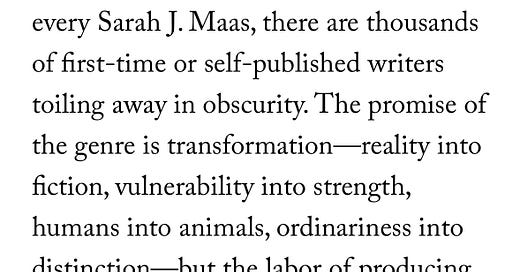Of course I enjoyed reading Katy Waldman’s “Did a Best-Selling Romantasy Novelist Steal Another Writer’s Story?” in this week’s New Yorker. It’s a great essay.
Is there plagiarism or copyright infringement involved in this particular situation? I don’t know.
What I do know is that this is way too many revisions before an agent submits a book.
“For the next three years, Freeman [the author] and Kim [the agent] worked together to expand and refine the manuscript…Throughout, [the author] says, Kim insisted that the manuscript was close to being ready…But, as the months dragged on, Freeman’s hopes began to wilt…She believes that she sent her agent at least forty meaningfully different versions of her manuscript.”
40!? Run away!! This process should not take nor need forty significantly different versions. It’s unusual for a novel, presumably signed up on a complete draft, to take three years of revisions. If you are getting a sinking feeling that your agent no longer sees the vision for your book, and a conversation about this disconnect is not fruitful, you can leave. Each revision of your manuscript should be improving it, reaching further toward its essence. I simply cannot imagine reading 40 versions of anything… and then if that book had sold to a traditional publisher, the author & editor would go through their multiple rounds of edits…
I also know that there’s a corner of writerly internet that is worried that agents and editors will steal their IP and give their book idea to another writer; this contingent tends to advocate for self-publishing to prevent this. I can imagine that this article is going to fuel this fear. But there’s a story of this type every few years (Emma Cline’s boyfriend suing her; “Who’s The Bad Art Friend,” “Cat Person.”) And I’ve read enough queries that sound weirdly similar to other queries I’ve read, or heard an author pitch me a book that sounds weirdly similar to something I’ve just read, to not discount coincidence, “it’s in the air,” or the tropes as a major component.
I am highlighting this paragraph because it is good:
So much of who gets published and who doesn’t comes down to luck. Being in the right place at the right time; submitting to the right person looking for this perfect match. In literary fiction, how one writes a story is more important than the story one’s writing, and it’s understood that the ‘what’ is more important than the ‘how’ for commercial fiction — but the essay certainly makes the case that the ‘how’ is just as essential for commercial/romantasy, too.







Say Nothing the book is a 100 out of 10 (I’m biased, I like almost anything Irish). Haven’t watched the show yet.
When I was an assistant to the cover editor at the New Yorker, we used to get cover sketch ideas from artists that were eerily similar! They were having the same idea (in reaction to the news cycle) simultaneously. I was interested to learn how many paranormal romances are all set in Alaska 😂